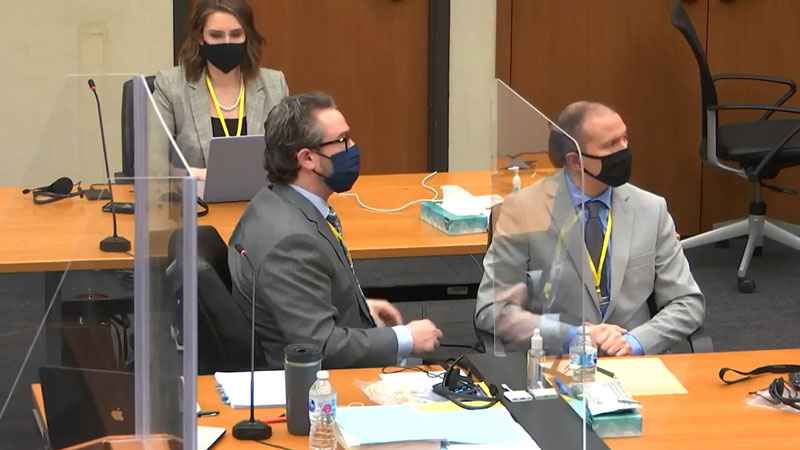Minnesota Supreme Court ruling could put 3rd-degree murder charge in play for ex-officer
[anvplayer video=”5012858″ station=”998122″]
UPDATE: Late Wednesday night, the Minnesota Court of Appeals offered clarity to a decision issued by the Minnesota Supreme Court earlier in the day, meaning the trial will proceed and Judge Peter Cahill will decide on the third-degree murder charge.
The Minnesota Court of Appeals ruled the Minnesota Supreme Court’s decision to not review the potential reinstatement of a third-degree murder charge against former officer Derek Chauvin has nullified the state’s motion to stay the trial.
The Minnesota Supreme Court declined Wednesday to hear the appeal of a former Minneapolis police officer who is trying to block a third-degree murder charge from being reinstated in George Floyd’s death.
At issue is whether the conviction of another former police officer in an unrelated case established a precedent for prosecutors to restore a third-degree murder charge against Derek Chauvin that the trial judge dismissed earlier.
Complete coverage of the Chauvin trial can be found here
The high court’s decision left open the possibility that the judge could add the charge back, lessening the chances that his trial would be delayed over the dispute.

In this image from video, defense attorney Eric Nelson left, and defendant, former Minneapolis police officer Derek Chauvin, right, listen as Hennepin County Judge Peter Cahill presides over jury selection in Chauvin's trial, Tuesday, March 9, 2021 at the Hennepin County Courthouse in Minneapolis. Chauvin is charged in the May 25, 2020 death of George Floyd. [Court TV, via AP, Pool]
Judge Peter Cahill noted the ruling during a break and told the prosecution and defense that they’ll discuss the issue Thursday morning before jury selection begins for the day. He noted that there are still some legal issues left to be decided before resolving that dispute.
Just got off the phone with @Oslerguy, who tells me this means the CoA ruling will stand and the issue now goes back to Judge Cahill to decide whether 3rd degree murder will come in @KSTP https://t.co/oCQ0Otlkbw
— Kirsten Swanson (@KirstenKSTP) March 10, 2021
Attorney General Keith Ellison, who is on the prosecution team, issued the following statement on the update:
"The Supreme Court was right to decline Mr. Chauvin’s petition for review. The Court of Appeals ruled correctly; therefore, there was no need for the Supreme Court to intervene. We believe the charge of 3rd-degree murder is fair and appropriate. We look forward to putting it before the jury, along with charges of 2nd-degree unintentional murder and 2nd-degree manslaughter."
And what about the outstanding state’s request for the Court of Appeals to stay the proceedings?
— Kirsten Swanson (@KirstenKSTP) March 10, 2021
Osler: "well it… certainly makes it seem less important." We expect this issue to be discussed in open court Thursday morning @KSTP #DerekChauvinTrial
“The fact that the court decided it quickly, efficiently and within days really shows the court of cognizant of the importance,” said Rachel Paulose, a former U.S. Attorney and University of St. Thomas School of Law professor.
She told us typically appeals take months, if not years. The one page decision from the Minnesota Supreme Court was also unusual, according to Paulose.
“Typically when you receive an order from the Minnesota Supreme Court, it goes on for pages and pages,” she said. “It describes the factual record, it describes the fighting issue in front of the court, it describes the parties perspective positions on that issue and then it describes the state of the law and ultimately the court’s reasoning for why it came to the answer it ultimately does. None of that is a part of the court’s order.”
5 EYEWITNESS NEWS asked if the court will eventually share that additional context.
“It appears at this stage that we’re not going to receive an answer from the Minnesota Supreme Court before trial begins unless Judge Cahill delays the trial,” she said.
According to Paulose, it’s now up to Cahill to decide whether to reinstate the third-degree murder charge.
“The judge doesn’t have to make that decision tomorrow morning but I do think he has to make it before trial begins,” she said. “The state is pressing, understandably, for the decision to be made as soon as possible so that everyone understands in the interest of fairness the array of charges Chauvin and his co-defendants will be facing.”
She said she is concerned about the level of uncertainty and lack of clarity that persists.
“We don’t know what the Minnesota Supreme Court believes about third-degree murder, we don’t know how the Minnesota Supreme Court would define the elements of third-degree murder, we don’t know if the Minnesota Supreme Court would apply third-degree murder, find it an applicable charge in this case,” Paulose said. “We don’t know if the Minnesota Supreme Court would throw out a third-degree murder conviction even if jury found Chauvin guilty of that. All of that presents an incredible amount of uncertainty.”